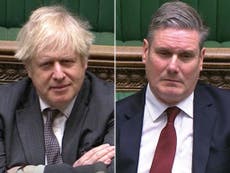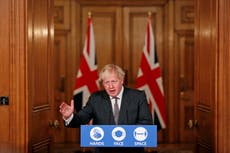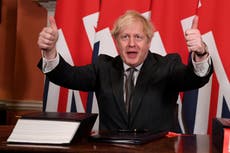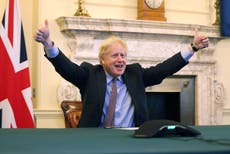We are a country going backwards with a leader who can’t be trusted – the rest of Europe can see that
There is a lot of reality within the pages of the Brexit deal that will catch up with Boris Johnson’s claims

There was a time, not that long ago, when it was considered a positive for a country to have a positive image abroad. “Soft power” it is called, an intangible feeling about a place and its people that makes people worldwide want to go there to work and play, study, explore, holiday, invest, do business.
The UK has consistently done well in “soft power”. The four nations, and their many great cities, all have a role in that. We are also surely blessed, for such a small country, in the range and scale of wondrous landscape and seascape, never more than a short ride away.
Our rich history, and our monarchy today, especially the Queen, play a part in our “soft power”. Looking at culture too, from William Shakespeare to The Beatles, Charles Dickens to the BBC, and fictional creations such as Harry Potter or James Bond, we always have been, and probably always will be, world leaders in the arts.
Our scientists and inventors gave the world some of its most significant developments, and continue to do so. For good or bad – the good we thought it heralded or the bad it has all too often led to – the epoch-making world wide web would not be as it is had it not been for Tim Berners-Lee.
We can make a reasonable claim, also, to having invented many of the most popular sports and pastimes in the world, and any assessment of our “soft power” today would have to include the global clout of the Premier League.
Nor should we underestimate the advantages of widespread respect for our parliament and politics, and our absolute adherence to the rule of law, recently undermined by the current government.
It is perhaps because we have so much going for us that we risk taking our place in the world for granted, but we play around with “soft power” assets at our peril. Under Tory and Labour governments, diplomats the world over tried to ensure a positive view of the home country in the land to which they had been posted.
However, their political masters now appear to take pride in being condemned, ridiculed or otherwise maligned. Positive assessments by major foreign newspapers, magazines and TV presenters were once sought after, for they helped our “soft power”. Now Boris Johnson and his Vote Leave cabinet sect appear to be operating the Millwall strategy: “No one likes us, we don’t care.”
You do not need to spend too long surfing the internet before you find excoriating assessments in pretty much every major title in every major country.
But when I posted one such piece, an absolute evisceration from Der Spiegel, usually as mild-mannered as it is intelligent and well-informed, cue the tired old anti-German war jibes, or “If you like it so much why don’t you go and live there?” (Er, alas, I can’t, as it is one of the many rights and privileges that we have given away in the name of a sovereignty we had never lost.)
Johnson prefers to be liked than disliked. But if you asked him whose approval he would rather have, that of Der Spiegel or The New York Times, or of a man in Bassetlaw who voted to “get Brexit done” – not unreasonably he might put Bassetlaw Brexitman first. But as the Brexit deal plays out, experts, academics and journalists will do much of the analysis, and if and when it transpires that a negative analysis matches a negative assessment by those who voted for it on how it is playing out in their lives, then he may have cause to rue both. It is not an either/or.
Also, given Johnson’s habit of overpromising and underdelivering – Brexit is very far from done, as is clear from the many major loose ends in the agreement – it may be the assessment of the deal that leads to the disillusion of voters, or it may be the other way round. The point is that reality matters.
The many criticisms about the lies told and the chaos created will not worry Johnson for, like Trump in 2016, he was elected with the public already knowing of his casual relationship with the truth. As for chaos, for many on the disaster capitalist right, it is what they want; and so long as there is a bit more stability by the time of another election he won’t much care about anything happening now.
As David Cameron showed before him, Eton breeds in its pupils a confidence that whatever scrape they land in, they can get out of it. Cameron also showed, however, a limit is sometimes reached. Johnson has so far enjoyed a lot of luck in his political life. History, and not just that of his fellow Etonian predecessor but one, suggests it won’t last forever.
The luck he is having right now, I agree, has nothing to do with tons of digital newsprint being used overseas to suggest we are a country going backwards with a prime minister whose word cannot be trusted.
It is to do with timing – by the time the deal was done, the fake no-deal threat having been used, the country was sick of Brexit, more worried about Covid, and preparing for Christmas. Luck too, in the opposition deciding before even seeing a word of the deal that they would back it.
And luck galore in having several newspapers prepared to present the deal as the equivalent of Johnson single-handedly flying himself to the moon, rather than one that makes their readers poorer and takes a bucketful of rights away.
To read much of the UK media, and then the media abroad, is to flit between parallel universes. The general assessment overseas that the EU got the better of the deal, and that the UK risks paying a heavy price, is borne out by a cold-headed reading of the 1,246 pages.
There is a lot of reality in those pages that will catch up with Johnson’s claims. And do him, and, more importantly, the country, an awful lot of harm in the years to come.








Join our commenting forum
Join thought-provoking conversations, follow other Independent readers and see their replies
Comments